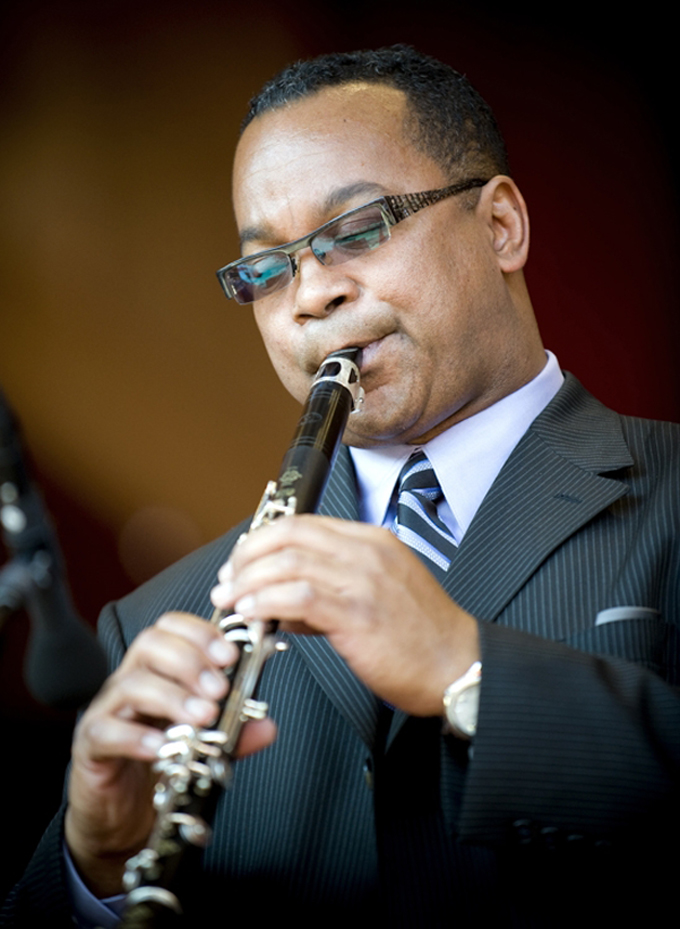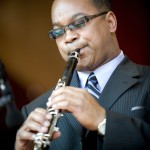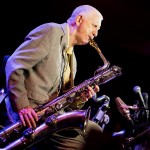NY Jazz Review by Marilyn Lester
In jazz music there are more idioms than you can shake the proverbial stick at. Cool jazz, smooth jazz, and straight-ahead jazz are some – all of which tenor saxophonist/clarinetist Victor Goines has mastered in his august career as a player, arranger, composer and educator. This outing at Dizzy’s Club Coca Cola could well be termed “laid back” jazz – it was so chilled out yet strikingly effervescent.
Dipping into a bag of solid jazz classics, Goines, with Chris Pattishall on piano, Russell Hall on bass and Joe Saylor on drums, opened with bebop sax wunderkind Charlie Parker’s 1945 “Now’s The Time.” Right away a lesser musician would have been on thin ice: for any performer, playing a repertoire made famous by towering legends might be daunting. Not for Goines; he’s well on his way to legend-hood himself, demonstrating a confident ease playing “Bird’s” demandingly fast yet melodic piece.
Goines’ chops as a composer were on display with two movements from the seven-movement, recently debuted “MLK Suite.” Intimations of a heavenly chorus themed “Michael the Archangel,” while compositional clarity was further demonstrated in the gospel-infused “Ain’t Going to Stand for This No More.” Goines played both pieces with agility. He’s got a light and precise touch on the keys; and no matter how fast or intricate the notes, Goines makes each one count.
Joe Temperley, undisputed king of the baritone sax, joined the quartet for the rest of the set. Temperley, already a legend in his own right, replaced the – yes, legendary – Harry Carney in the Duke Ellington Orchestra in 1974. He is also a founding member of the Jazz at Lincoln Center Orchestra (which Goines joined in 1993). The discerning ear would know Temperley’s distinct sound blindfolded: big, rich, resonant and absolutely solid. At age 85 the man can still blow a mean instrument. For their first number, the two played the 1947 lyrical standard, “Robbin’s Nest,” by Illinois Jacquet and Sir Charles Thompson.
It wouldn’t have been an evening of standards without at least one Duke Ellington tune. “Creole Love Call” was the choice, a 1928 piece written for singer Adelaide Hall. In this instance, the vocal instrument was replaced with Temperley on alto clarinet and Goines on bass clarinet. Both instruments have a rich, earthy tone well suited to Ellington’s visceral tune. As one might expect from their long association, Goines and Temperley work together like hand in glove, and their close harmonies were sublime. Who needs a singer with work like this?
Those transporting harmonies were further demonstrated in Thelonius Monk’s 1953 B-flat standard, “Blue Monk,” with Temperley continuing on the alto clarinet, and Goines on the “traditional” B-flat clarinet. Monk was known for angular melodic twists, which gave Goines the opportunity to coax some percussive and wailing sounds from his instrument – all of them coming out completely clean and vibrant. On Johnny Mandel’s 1964 hit “Emily,” Goines’ clarinet was the perfect choice for this sweet, lilting tune, with the notes floating off the stage, and wafting gently throughout the room.
The closer for the evening was “Good Bait,” by a jazz pianist Tadd Dameron, a solid composer whose notoriety has receded over time (Dameron died in 1965). Written for Count Basie in 1944 (and played by both Charlie Parker and that other sax “god,” John Coltrane) “Good Bait” is based on the changes to “I’ve Got Rhythm.” It’s lyrical and melodic rhythms demand a dexterity and mastery of the instrument that Goines and Temperley aced with ease.
Throughout the set, sidemen, Pattishall, Hall and Saylor, provided steady, supportive backup. As is the jazz way, each had his turn to shine, yet the solos while virtuosic, were also restrained. Clearly the evening belonged to the dynamic sax duo of Goines and Temperley – the perfect pair for a relaxed and warm evening of warm – and hot – classic jazz on a cold winter’s night.
Victor Goines and Friends, February 6, 7 and 8 at 7:30 and 9:30 pm
Dizzy’s Club Coca Cola, 10 Columbus Circle, 212-258-9595, www.jazz.org/dizzys/




















